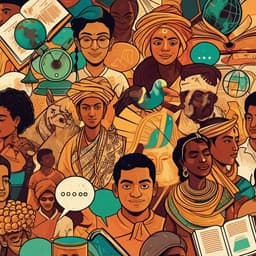
Humanities
A comparative study of emotional narratives in Chinese science fiction: exploring the gender perspective
Y. Liu
The study addresses whether gender influences emotional narratives in Chinese science fiction. Although Mary Shelley's Frankenstein is a seminal female-authored work, science fiction has historically been dominated by male writers until the New Wave movement, which increased gender diversity. In China, notable contributions by female science fiction authors have become more visible only in recent decades. Some argue Chinese SF historically lacked gender consciousness due to its science-popularization mission, while recent anthologies of women’s SF have raised attention to female perspectives. Critical discourse often claims women’s writing displays richer, more delicate emotionality, including love and complex affective entanglements. Even some female SF writers acknowledge prioritizing emotional storytelling. Quantitative linguistic studies have identified gendered stylistic differences in general (e.g., function word/PoS usage), and autobiographical narrative research suggests women may express more affect and connection; however, large-scale literary analyses indicate a convergence in gender differences in emotional expression since 2000. Given genre-specific variability, this study focuses on science fiction, where women writers are fewer, to evaluate whether gender correlates with distinct emotional narrative patterns using quantitative affective computing.
The literature highlights: (1) Historical male dominance in SF and the late emergence of prominent female perspectives (e.g., Le Guin, Lessing, Atwood; in China, greater visibility in the 21st century). (2) Claims that Chinese SF traditionally lacked gender consciousness due to its pedagogical/science popularization orientation and national mission. (3) Critical assertions that women’s literature features nuanced emotive storytelling and greater complexity in affect (e.g., Chen Jirong; Wu Yan). (4) Observations in recent Chinese women’s SF anthologies emphasizing romantic/poetic elements and gendered contrasts in emotional focus. (5) Some women SF authors self-identify with emotional storytelling. (6) Quantitative stylometry shows gender can be predicted from linguistic features (Koppel et al., 2002), while narrative psychology suggests women express more affect in autobiographical writing (Grysman et al., 2016). (7) A large cross-national corpus indicates historical female dominance in emotional content but convergence in gender differences after 2000 (Lettieri et al., 2023). These mixed findings motivate a genre-specific, quantitative analysis within Chinese SF.
The study applies affective computing to quantify emotional narratives in Chinese SF. The approach uses a lexicon-based sentiment analysis due to the lack of suitable annotated literary corpora in Chinese and the need for interpretability. Texts are segmented using Jieba, emotion words are matched to the Chinese Sentiment Vocabulary Ontology Library (CSVOL), which includes 20,000+ entries annotated with polarity (positive, negative, neutral, mixed), intensity (1,3,5,7,9), part of speech, and classifications based on Ekman’s basic emotions, refined to seven categories: pleasure, goodness, anger, sadness, fear, disgust, surprise (with 21 subcategories). Sentiment values per segment and emotion are computed by summing intensity values of matched words and normalizing by segment length S(M,k) = sum(P_w)/N_M. Polarity is computed by subtracting negative from positive intensities: S(M) = sum((-1)^i P_w)/N_M, where i=0 for positive, 1 for negative. Two feature quantities are defined from emotional arcs (constructed by dividing each story into five equal-length segments, approx. 2000 words): (1) Richness R = Σ_{M,k} S(M,k), aggregating the magnitude across all segments and emotions to capture overall quantity/intensity of emotional expressions without cancelation across polarities; (2) Twistiness T = Σ_M |S(M,k) − S(M+1,k)|, summing absolute differences between adjacent segments to measure fluctuation/variability in emotional trajectories. Corpus 1: A balanced set of 66 short stories—33 by women from the anthology “She: Classic Works by Chinese Women Science Fiction Writers” (1985–2021), and 33 by men selected to match publication-year distribution and average length (~10,000 words). Corpus 2 (key writers): 12 influential authors (6 male, 6 female) with numerous short stories (3,000–20,000 words) to assess intra-author variability; counts include, e.g., Wang Jinkang (48), Liu Wenyang (25), Liu Cixin (24), Chen Qiufan (21), Zhao Haihong (23), He Xi (18), Lin Chen (18), Xia Jia (8), Gu Shi (12), Chi Hui (13), Cheng Jingbo (21). Emotional arcs are computed for each story (7 emotions + polarity across 5 segments). Similarity between authors’ distributions in Richness–Twistiness space is defined as the intersection-over-union of the convex boundary areas enclosing each author’s scatter of works.
- Emotional arc overview: Across the 66 stories, different emotions show distinct value ranges; "goodness" and "disgust" have the highest values, while "anger" and "surprise" are lowest. No significant numerical disparities in arc magnitudes or shapes were observed between male and female groups for any emotion category. Averaged arcs for male and female subsets exhibit only slight, non-systematic differences.
- Richness and Twistiness: These metrics effectively capture stylistic differences at the work and author levels. For instance, Yin Kemi’s "No Matter What's Real" shows high Twistiness and Richness due to pronounced fluctuations and explicit inner-feeling descriptions across segments. In contrast, Liu Cixin’s "Take Her Eyes" demonstrates relatively low Richness and Twistiness due to restrained affect and a distant narrative stance emphasizing setting and background.
- Key writers’ distributions: Substantial inter-author variability is evident. Liu Cixin’s works cluster at lower Richness (more restrained emotional narratives), whereas Wang Jinkang’s cluster at higher Richness, consistent with character-centered plots and frequent romantic elements. Lin Chen displays broader dispersion (versatile emotional styles) compared to He Xi’s more uniform distribution. Chi Hui’s works generally show lower Richness and Twistiness than peers.
- Gender comparison: When aggregating works by gender, the scatter distributions of female and male authors overlap substantially, and variability within each gender is comparable to variability across genders. A quantitative similarity analysis (IoU of boundary regions) shows relatively more high-similarity author pairs across genders than within the same gender group, reinforcing that differences are driven by individual creative styles rather than gender.
- Narrative perspective count: Among 66 works, only 10 female-authored and 7 male-authored works adopt a predominantly female perspective, indicating a predominance of male focalization, which may attenuate hypothesized gender differences in emotional expression. Overall, there is no significant disparity in emotional narrative styles between male and female Chinese science fiction writers at the group level, despite clear individual-author differences.
The corpus-based, quantitative approach challenges generalizations derived from reading a few prominent works, illustrating the value of digital humanities methods. The findings indicate convergence in emotional narrative styles across genders in Chinese SF. Three contextual factors help explain this: (1) Predominantly male narrative perspectives in both male- and female-authored stories may weaken detectable gender-linked affective differences; (2) The legacy of science popularization and the prevalence of children’s SF (with simpler, more direct emotions) persist in the field, influencing affective patterns; (3) Many SF works prioritize setting, sense of wonder, and conceptual exploration over character interiority, rendering emotions a secondary narrative element for both genders. Consequently, observed stylistic variation is best attributed to individual creative approaches rather than gender. This supports broader findings of converging gender differences in literary emotional expression in the contemporary period and cautions against extrapolating genre-wide claims from limited samples.
This study operationalizes emotional narrative style using lexicon-based affective computing, introducing Richness and Twistiness derived from emotional arcs, and applies these to balanced corpora of Chinese SF by male and female authors, including a key-writers dataset. The analyses show marked inter-author differences but no significant gender-based disparity in emotional narratives at the group level. The work contributes interpretable, quantitative tools for literary analysis and a genre-specific perspective on gender and emotion in SF. Future research could improve segmentation by aligning with narrative scenes rather than equal-length chunks, incorporate context-sensitive sentiment modeling to address irony, indirection, and long-range dependencies, and extend annotated literary corpora to enable supervised approaches and multilingual comparisons.
- Text segmentation: Dividing works into equal-length segments can split coherent scenes, potentially distorting local affective measures; ideal segmentation would be scene-based, but reliable automated scene detection remains immature.
- Lexicon-based sentiment limits: Indirect descriptions, sarcasm, deception, and figurative language can elude detection; the approach may misalign surface polarity with deeper, contextually shaped emotions.
- Context insensitivity: Word/sentence-level computation underweights story background, buildup, and character development, potentially biasing results.
- Corpus design: Although balanced and representative, each of the 66 authors in the first corpus contributes one story, and matching length/era constraints required selection trade-offs.
- Emotion category and lexicon bias: Distribution differences across emotion categories may reflect lexicon coverage/analog vocabulary rather than only textual properties.
Related Publications
Explore these studies to deepen your understanding of the subject.







